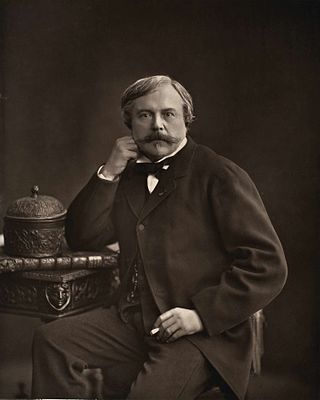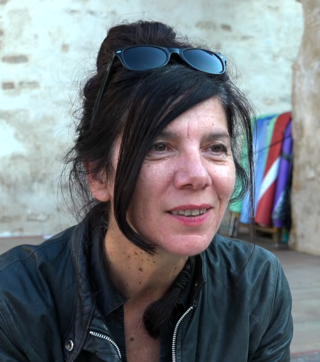
The Prix Goncourt is a prize in French literature, given by the académie Goncourt to the author of "the best and most imaginative prose work of the year". The prize carries a symbolic reward of only 10 euros, but results in considerable recognition and book sales for the winning author. Four other prizes are also awarded: prix Goncourt du Premier Roman, prix Goncourt de la Nouvelle, prix Goncourt de la Poésie (poetry) and prix Goncourt de la Biographie (biography). Of the "big six" French literary awards, the Prix Goncourt is the best known and most prestigious. The other major literary prizes include the Grand Prix du roman de l'Académie française, the Prix Femina, the Prix Renaudot, the Prix Interallié and the Prix Médicis.

Edmond Louis Antoine Huot de Goncourt was a French writer, literary critic, art critic, book publisher and the founder of the Académie Goncourt.
French literature generally speaking, is literature written in the French language, particularly by citizens of France; it may also refer to literature written by people living in France who speak traditional languages of France other than French. Literature written in the French language by citizens of other nations such as Belgium, Switzerland, Canada, Senegal, Tunisia, Algeria, Morocco, etc. is referred to as Francophone literature.
This article contains information about the literary events and publications of 1865.

John Antoine Nau (1860–1918), real name Eugène Léon Édouard Torquet, was a French poet and writer most famous for his novel Enemy Force, which won the first Prix Goncourt in 1903.

Jules Alfred Huot de Goncourt was a French writer, who published books together with his brother Edmond. Jules was born and died in Paris. His death at the age of 39 was at Auteuil of a stroke brought on by syphilis.

Gabrielle Réjane, néeGabrielle Charlotte Réju, was a French actress of the late 19th and early 20th centuries.
The Société littéraire des Goncourt, usually called the Académie Goncourt, is a French literary organisation based in Paris. It was founded in 1900 by the French writer and publisher Edmond de Goncourt (1822–1896), who wanted to create a new way to encourage literature in France and disagreed with the contemporary policies of the Académie Française.

Marie-Madeleine Guimard was a French ballerina who dominated the Parisian stage during the reign of Louis XVI. For twenty-five years she was the star of the Paris Opera. She made herself even more famous by her love affairs, especially by her long liaison with the Prince of Soubise. According to Edmond de Goncourt, when d'Alembert was asked why dancers like La Guimard made such prodigious fortunes, when singers did not, he responded, "It is a necessary consequence of the laws of motion".

Shan Sa is the pseudonym of Yan Ni, a French author and painter. The Girl Who Played Go was the first of her novels to be published outside France, and won the Prix Goncourt des Lycéens. Her second novel to appear in English translation was Empress (2006). She was awarded chevalier of the Ordre des Arts et des Lettres in July 2009 and chevalier of the Ordre national du Mérite in May 2011.

The Goncourt brothers were Edmond de Goncourt (1822–1896) and Jules de Goncourt (1830–1870), both French naturalism writers who, as collaborative sibling authors, were inseparable in life.
Marthe, histoire d'une fille was the first novel by the French writer Joris-Karl Huysmans, published in 1876.

Henriette Louise de Bourbon was a French princess by birth and a member of the House of Bourbon. She was the abbess of Beaumont-lès-Tours Abbey.
Stéphanie Corinna Bille was a French-speaking writer from Switzerland.

Guy Mazeline was a French writer, winner of the prix Goncourt in 1932 for his novel Les Loups, surprisingly winning against Voyage au bout de la nuit by Louis-Ferdinand Céline.

Alice Zeniter is a French novelist, translator, scriptwriter, dramatist and director.

Catherine Cusset is a best-selling French novelist and the author of Life of David Hockney: A Novel, The Story of Jane, and 12 other novels published by Éditions Gallimard between 1990 and 2018. Some of her novels are described as autofiction, a French literary movement that is a hybrid of fiction and autobiography. Others are more romantic, but all share some recurring themes: the family, desire, and cultural conflicts between France and America. She stands out from her contemporaries with a direct, incisive, visual form of writing, marked by the influence of Anglo-Saxon novelists.

Brigitte Giraud is a French writer, author of novels and short stories. She was awarded the 2022 Prix Goncourt for her autobiographical novel Vivre vite.

The Goncourt Journal was a diary written in collaboration by the brothers Edmond and Jules de Goncourt from 1850 up to Jules' death in 1870, and then by Edmond alone up to a few weeks before his own death in 1896. It forms an unrivalled and entirely candid chronicle of the literary and artistic Parisian world in which they lived; "a world", it has been said, "of bitter rivalries and bitterer friendships, in which every gathering around a café table on the Grands Boulevards [was] a chance to raise one's status in the byzantine literary hierarchy". Fear of lawsuits by the Goncourts' friends and their heirs prevented publication of anything but carefully chosen selections from the Journal for many years, but a complete edition of the original French text appeared in the 1950s in 22 volumes, and there have been several selective translations into English.

Auguste Alfred Rubé was a French painter noted especially for his theatre decorations.















